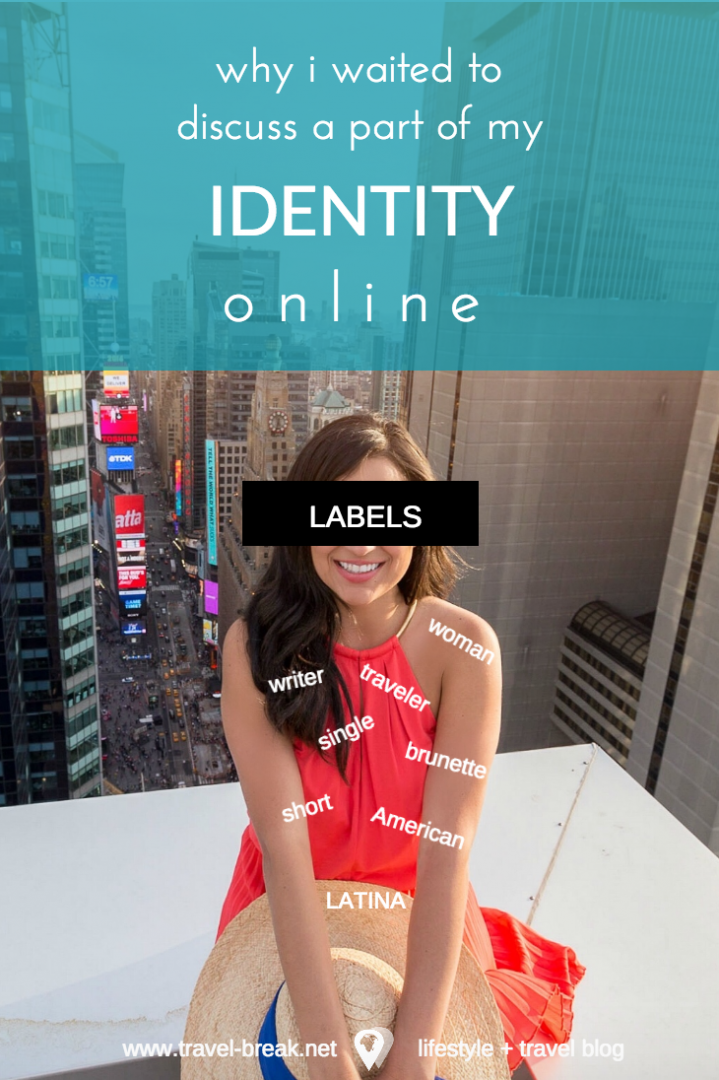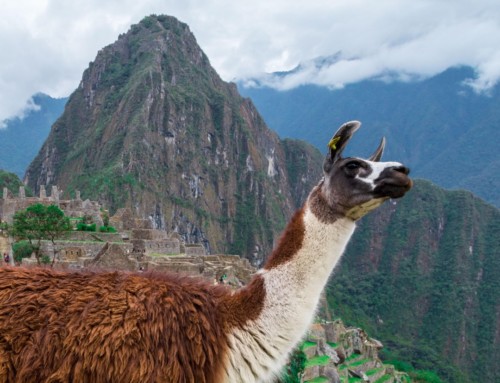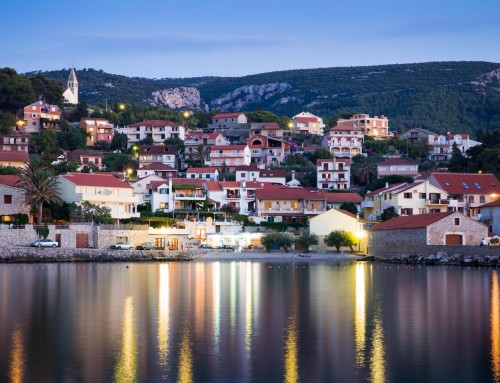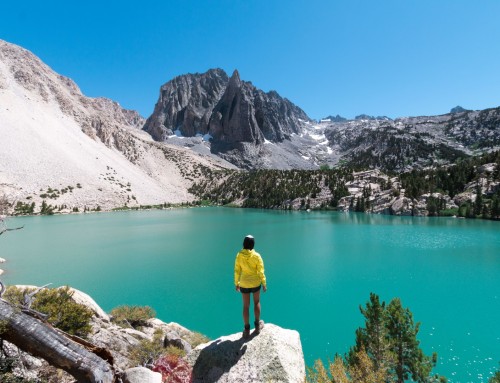An exploration of race, nationality, labels and identity.

If I write my captions in Spanish or mention that I’m Latina, will non-Latinos think I’m no longer relatable? Will they think I’m un-American?
Two years later and …SURPRISE… Yo hablo español.
Was I holding back on revealing my Latina identity on purpose? Did I not notice that I wasn’t discussing my race? Why discuss my identity now?
Recently, I started to write my Instagram and Facebook captions in Spanish (in addition to writing them in English).
Why? Quite frankly, I have family and friends that don’t speak English fluently, and I just wanted them to know what was going on with my life. I wanted to include them.
But it wasn’t like I hadn’t thought about this before. Originally, I had hesitated to sharing my work in Spanish. I think about everything I do, especially when it’s going to to be all over the Internet, “influence” people and/or affect my business (the hustle is real and good-bye clients that don’t like sensitive topics).
“Whatever, it’s happening” I told one of my best friends. Maybe people will see someone that they already like and realize that Latino immigrants aren’t all rapists and criminals. Maybe, instead of thinking of me differently, they’ll think about Latinos differently.
For lack of a better phrase, I suddenly felt like I was “coming out” as Latina.
I am sharing a part of my identity that isn’t always obvious online (or in person); an identity that I know would inevitably be rejected by some people who don’t know me.
I consciously decided that I don’t care if people are turned off by my bilingual captions. I promote travel and culture — the more people I can reach the better.
So while before, I wasn’t hiding my identity, I knew that I also wasn’t actively sharing it.
Here’s why:
1. I’m more than a label and a statistic.
Being Latina is a part of who I am, but not the only character in my identity.
I didn’t want to be pigeon-holed into a “Latina voice.” I love Salsa music, but I dislike Banda music. I listen to hiphop, rock and pop a whole lot more than any Latin music. I’ll be the first to make kale and grilled-fish tacos which is a blend of traditional Baja food and LA #fitfam glamour.
In short, I have never fit into a cookie-cutter image of the American girl-next-door, but I also don’t “belong” within most Chicano groups. I don’t fit in anywhere, so I fit in everywhere.
I’m not the only person with a complex identity.
As humans, we use labels to understand people we don’t know. “American” and “Latina” are not accurate labels of who I am entirely. It’s not that I’m not Latina (I am), I may just not the type of person you define as “Latina.” It’s not that I’m not American (I am), I just don’t encompass all things your understanding of “American.”
As a writer and spokesperson, I was immediately and automatically forced with the labels “woman,” “millennial,” “bikini blogger,” and “single.” I didn’t get to choose those labels, even if they’re a real part of who I am. On the other hand, I had to earn “entrepreneur,” “business person” and “photographer.”
Labels are funny like that…
More often than not, we don’t get to choose how people label us, but we do get to shape the impression we make. I have a white privilege that allows me to be ethnically ambiguous and that means that I have the luxury of sharing my racial identity when I am ready.
With so many other labels, I wasn’t ready to talk about my race. Not to mention, I was proving that despite being Latina, I’m just a normal person doing things in spite of my culture and heritage.
So sorry, I’m not sorry, instead I just wrote about how to rent a private islet in Croatia for $200, 5 Peruvian Sites You Missed Haulin’ Bum to Machu Picchu, and My Top 25 World Experiences by the Age of 25.
2. Racial and ethnic pride are often misinterpreted as anti-American.
Immigrant parents sometimes keep their children from learning their native language because of harsh judgment, hate and desperate calls for assimilation.
I don’t believe in separatism, but I also know that having pride for your country and your history is not mutually exclusive.
When my grandparents and parents came to America, they did so because they love America. They wanted to be American (which they have become). Unfortunately, some people think that by having pride in your heritage — you somehow aren’t patriotic… as if the two identities are exclusive.
I would never want for Americans to feel that I don’t have pride in being American just because I love my Latin culture too.
Having more than one culture in your life is like having two parents and thinking that if you love one, you can’t love the other. It’s simply doesn’t work that way.
3. Given my social community is predominantly American, it’s challenging to address race without sounding like an “angry minority.”
I can’t win. If I talk about race, I’m a bad person. If I don’t talk about race I’m ignoring the problem. Given silence isn’t ignoring the problem, but rather a part of the problem — I have to make my identity clear.
Sharing who I am isn’t just a way to provide a role-model for people like myself, but to say “hey, I have a lot of privilege with how you understand my identity, and I’m telling you it’s wrong.” I don’t think you’re a bad person, I just think you’ve been misinformed, so I’d like to clear it up or at least make you think about it.
4. It’s a whole lotta weight to represent an entire racial group, especially online.
OMG Stephanie loves to cook and dance to Latin music. STEREOTYPE FULFILLED> every single other stereotype is true for every single Latino person.
No. Just no.
I’ve traveled to almost 200 places — do you know how many of the people I’ve met around the world have never met a Latina? A person of color? A white person? No pressure… there I am just representing millions of people in a few hours.
It’s fun to deal with in person, but misrepresentation is challenging online. People are quick to pull the trigger behind the keyboard. At least in person, you might make a real impression.
I’m pretty sure I was the first non-black person some of the kids saw at the Junkanoo Festival in the Bahamas. However, for the most part, I’ve been exotified around the world for being different.
I tell someone I’m American, but they will ask where I’m “really” from.
It doesn’t offend me that people are curious about my culture. However, I’m not perfect. I’m going to say and do things that are wrong and I don’t want my entire race to be demonized for my slip ups.
5. My race is often used against me as a justification for my success.
Over and over and over.
Let’s take high school for example. Ironically, I only wanted to go to UCLA because I couldn’t imagine moving too far from my family (so “Latina” of me). When admissions rolled in, I had to sit through AP History with my “friends” (who didn’t get in and were all-American males) reminding me how I only got in because I was a Latino and a woman (despite being valedictorian, on Varsity Dance, breaking a record in community service, holding leadership roles in Student Government, Yearbook and randomly starting a salsa team at a high school that lacked diversity).
Do you know what it’s like for people to attribute your success to affirmative action? I bet people tell Obama he only made President because he is black. I bet people think Hilary Clinton is only a qualified Presidential candidate because she’s a woman.
By waiting to share my racial identity, I can say that I grew my blog because people like me as a person, not because companies needed to fill a racial quota. Not because there weren’t any other popular Latina travel bloggers. Not because people felt bad for me and needed to include a Latina in their round ups. Not because people were trying to be politically correct. Not because of *insert any freakin’ excuse you need to justify why I’ve done well or maybe even better than someone else.*
Because I waited to share my racial identity, you can’t say that I grew my readership because of a hand-out, but instead that I grew despite the need for one.
And that’s why I share it with you today. I no longer care how you attribute the success of my blog, my business and my being. You’re right — being Latina is a part of why I got into UCLA. It is a reason I got that job offer you didn’t. Being Latina and being American is an uncomfortable subject you can snicker about at brunch. Being Latina is why my business grew so quickly in two years.
Why?
Because like being American, being Latina is not all of who I am, but it is very much a part of who I am — a part I am proud of.
Sincerely,
Your first-generation American. Latina. Woman. Artist. Entrepreneur. Daughter. Friend. Traveler.
POSTS YOU MIGHT LIKE
Adventurous is the New Pretty: 20 Female Travelers Re-Defining Beauty
My Top 25 USA & Mexico Travel Experiences at 25 (Photos)
My Top 25 World Travel Experiences at 25 (Photos)
Baby, Don’t Buy Me Roses – – Take Me Somewhere New












There will ALWAYS be detractors…ignore them and just keep doing your thing.
Like you wrote, this is only part of your identity. Just keep bring you..all of you.
Thanks so much for reading Scott! Proud to bring it on 100%!
I guess I never though that Latino people would get the “Where are you really from” questions. I guess I was wrong! Awesome that you’ve “come out” now and feel like it was the right time to do it.
I think about race and gender a lot these days. I always find that it feels weird to be a Western yet Asian woman whenever I’m in Asia.
Thanks for reading :) My identity has always been more apparent in person. I often even say my real last name with an accent to open up the conversation because I have noticed that people are less likely to say racist things around me if they know I’m Latina. Like people censor themselves more or something. Ironically, the same way people probably ask you where you’re from when you’re in Asia, I still get the where are you from when I’m in Mexico or Latin America. People want to hear Mexican-American… which works because that’s what I am, but it’s so interesting that they aren’t content with one answer or the other.
I love that you say your last name with an accent! I found that happens much more in London than back home in New York, and I feel like it needs to happen more in the States. People here also make an effort to try to pronounce names as they are meant to be pronounced, rather than give nicknames and such. There is such low “literacy” in the States for how foreign names are pronounced, but maybe that will change as more people get traveling.
That’s interesting that you’ve noticed people are less likely to say racist things around you if they know you are Latina. I wonder if would work with other things, like would people say fewer anti-immigrant things if they knew my parents were immigrants.
I love this article! As a chinese-american, I often face the same problems that you mentioned in your article. I often worry that it feels like I’m representing my entire race (which I’m not!) Although, when people see my face they can usually tell straight up that I’m not white. Funny story actually – I always thought you looked Latina and assumed that you may have mentioned it somewhere I didn’t see… but it it didn’t really affect my perception of you. But now I see that it was a conscious decision! I’d like to say that I don’t think it will really change anything because you’re still you, but I don’t know if some small-minded folks might say differently…
Also I thought UCLA didn’t use affirmative action? Not that it really matters to the point of this post, just wondering.
Wow this comment is all over the place, haha. Sorry bout that. In summary, I really enjoy this article and relate to it a lot.
So interesting… so first I felt like this was a Latino issue, then I thought of my Asian-American friends… then my gay friends.. then Muslim friends and that’s when I realized how it’s so much more complex than “Latina.”
Affirmative action hasn’t been in place since the 90’s, but that didn’t keep my friends from eating me alive from Senior Year of high school.. I didn’t know that at 17. I’ve become a lot more knowledgable about issues so I can retort with facts. It happens none-the-less.
Great post that should be a must read for all your fellow Americans. As a Canadian, we can say this with some objectivity. Stephanie, you appear to be a kind soul, enlightened and honest. All personal attributes that align with all that is right with this world. Keep livin’ la vida loca and always wear your ethnicity with pride. Shine on!
Awww thank you so much for reading and for your kind comment. I do love Canadians.. and OMG you’d be surprised how some Americans who have never met a Canadian have strong opinions about them too lol I LOVE CANADIANS
Wow, I have to say you’ve definitey hit an emotional chord with this one. I could associate with eveything you said 100%. Everything I’ve ever felt or feared you just wrote in an honest, eloquent article and I admire how brave you are for opening up about this topic. Traveling people always want to know where you’re really from and many just assume you’re a local. I’ve even had a “Mean Girls” movie moment where someone asks: “If you’re American…then why aren’t you…ummm…” akward silence.
I admire you for “coming out”.
Thank you so much for reading :) It’s always a bit awkward to write about it, so it’s encouraging to know that it’s relatable :) Happy travels!
¡¡¡SIIIIIIIIII~~!!!!! 😭💖😭💖
I know this is an older post but I’ve just discovered this site and I am LIVING FOR IT!! I am SO so so happy to learn about another travelling latina, but also what you said was so poignant: if people know that you’re latina THEY’RE the ones that are going to have another reference point of latinos. That’s hugely beneficial to you and the larger community. That’s amazing. I’m not American, but I am a Colombian, so I’m constantly fighting negative stereotypes from strangers as well as people I know and love! It’s tough but if we respect ourselves, live wholly in our truth, the only thing others can do is RESPECT that, and if they don’t I don’t want to associate with them anyway.
Keep PREACHING! I’m paying attention. Loved this post 💃